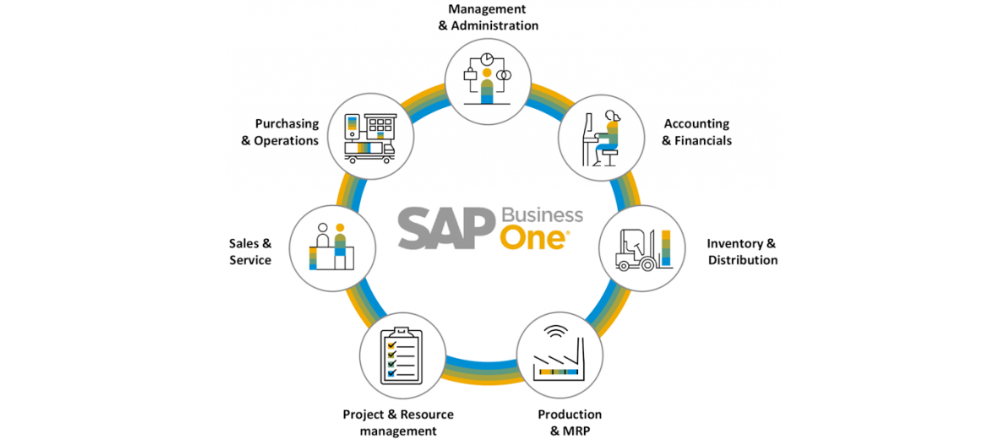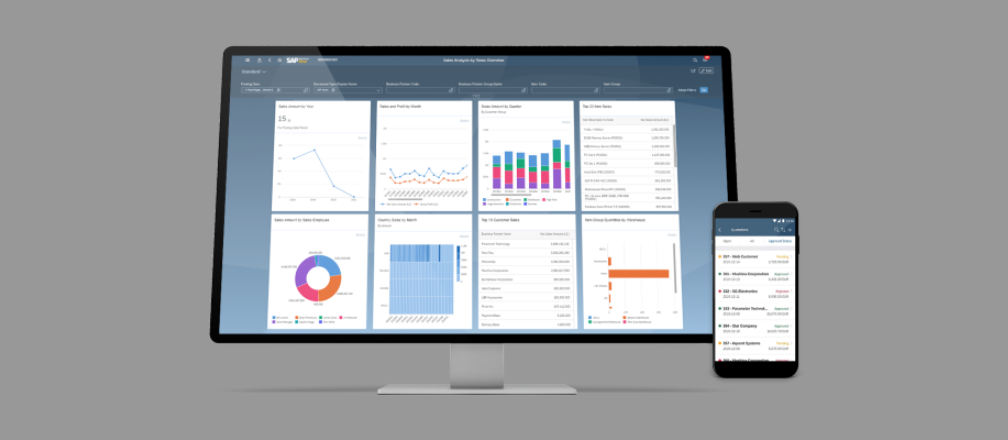SAP Business One: Meaning, Modules and Features

In today’s dynamic business realm, it is important to be efficient and adaptable. These are the keys to success for medium and small-size enterprises. SAP Business One is known to be one of the best ERP solutions that can be beneficial for small and mid-sized businesses to streamline their business workflow by providing an integrated solution. It has the ability to cater to different aspects of businesses.
In this blog, we will try to dive deeper into SAP Business One and find out the features and modules. You will be able to understand how this ERP solution can become the transformative potential for all modern businesses.
What is SAP Business One?
SAP Business One is referred to as the versatile enterprise resource planning software. The software is specially created to meet the evergreen demands of small and midsize businesses. Therefore, this ERP module has been crafted to offer a cost-effective and comprehensive solution to manage the operational spectrum of businesses effectively.
It generally includes some of the most critical areas of businesses like finances, accounting, sales, inventory, operations, relationships, and human resources. Hence, one such design can be extremely beneficial in providing comprehensive insight and improving operational efficiency to make strategic business decisions.
Core modules of SAP Business One:

Financial Management:
One of the primary modules of SAP Business One is financial management. It serves as the backbone when it comes to ensuring efficient financial operations. It generally covers different aspects of financial tasks like journal entries, general ledger, financial reporting, budgeting, and payable and receivable management. Therefore, it is one of the best choices for small and mid-size companies not only to ensure effective management but also to comply with the regulations and streamline financial workflow. Therefore, it leads to improving financial visibility and better financial health.
Customer and sales management:
Customer and sales management is another module in the SAP Business One that becomes crucial for businesses that want to manage customer relationships and sales processes effectively. Such a module can be beneficial when it comes to keeping an eye on the entire sales cycle. It can guide everything from initial opportunity and contact management to after-sales support and invoicing. Therefore, it has been effectively crafted to improve customer satisfaction and streamline sales operations. Therefore, it contributes to increasing customer loyalty and revenue.
Inventory control and purchasing:
Inventory management and efficient purchasing is another module included in SAP Business One. It is crucial for maintaining the optimal operational flow in the businesses. Therefore, the solution can be greatly beneficial when it comes to assisting while managing the order-to-pay cycle. It includes assistance in stock levels, purchasing orders, and vendor contract negotiation. It is also helpful in managing inventory, controlling costs, and making sure that the supply chain seamlessly operates without obstacles.
Production planning:
Most of the businesses that are involved in manufacturing will find this module extremely efficient. The production planning module in SAP Business One becomes beneficial as it helps to streamline production, schedule, and plan, manage material bills, and keep an eye on the overall production procedure. Therefore, it can make sure to use the resources efficiently and also ensure timely product delivery. Hence, it can be beneficial to enhance the overall efficiency of the production.
Business Intelligence:
SAP Business One is a new-age ERP solution that is specifically designed for medium and small-sized businesses. This new solution can be helpful in making data-driven decisions. Businesses that understand and take data as one of the most important aspects will never fail to succeed. It is the key to successful business management. Therefore, the business intelligence module integrated into SAP Business One helps to integrate data from different business functionalities and then provides comprehensive reporting, insight generation, and analytics. It can be beneficial for businesses as it provides real-time data, which again becomes valuable for making informed and strategic decisions.
What are the key features of SAP Business One?

SAP Business One is known as the integrated Enterprise Resource Planning that is designed to perfectly streamline business operations and improve revenue. The robust set of features ensures that the business requirements are fulfilled.
Comprehensive Business Management:
SAP Business One has been designed with modules that cover all the important areas of business operations. From accounting to sales, operational and inventory management, and customer relationship management, SAP Business One has become the one-stop solution for people. Therefore, it can be defined as an inclusive ERP solution that makes sure that the business functions are integrated and aligned according to the business operation operations.
Accounting and finance management:
This is another key feature that enables businesses to seamlessly manage the overall financial process. It handles everything from planning and analysis to reporting and control. It includes functionality that becomes beneficial for businesses to make informed financial decisions. Therefore, this feature in SAP Business One simplifies the complicated financial process and makes sure to comply with the rules and regulations.
Production and MRP:
In manufacturing businesses where there is a need to handle a lot of aspects, MRP and production planning capabilities can be greatly valuable. Such a feature can help optimize and plan the manufacturing processes and effectively plan everything in a cost-effective manner. In addition to this, it can be integrated with other business process production planning to ensure reduced waste and increased efficiency.
Cloud deployment and Mobile access:
The availability of mobile access functionality can help businesses and their employees have access to critical business information from anywhere at any time. Therefore, such an enhancement provides immediate responsiveness and flexibility to businesses. In addition to this, SAP Business One can also be deployed in the cloud, which offers businesses some amazing benefits like reduced infrastructure costs, scalability, and secure data management.
Integration and Customisation:
It is important to understand that every business is different, and so are their requirements. Therefore, SAP Business One provides the freedom to customize and integrate according to the requirements. The flexibility offered to businesses can be customized as per the business requirements. This customization ability makes sure that SAP Business One is highly adaptable to businesses.
Benefits of using SAP Business One
Implementing SAP Business One can have a multitude of benefits for businesses. Following are some of them.
- It can greatly improve the operational efficiency by streamlining workflow and eliminating redundancies.
- The use of powerful analytics and real-time data can help business leaders make data-driven decisions.
- With the availability of sales and customer features, businesses can leverage the potential and effectively respond to customer requirements, which improves customer relationships.
- Using SAP Business One ERP solution can optimize inventory and production processes, which is beneficial for manufacturing industries.
- As SAP Business One can be customized according to the business growth, it is known as a scalable solution.
Conclusion:
SAP Business One is not only just another ERP solution, but it is an all-inclusive tool for small and mid-sized businesses. It has been precisely crafted with all the required features and functionalities that provide valuable insights, increase business relationships with customers, boost operational efficiency, and increase overall business growth.
Such impact in the modern business landscape can pave the path towards success, irrespective of the business size. Make sure to choose a reliable implementation partner who can ensure proper assessment of the business operation to ensure successful integration.

